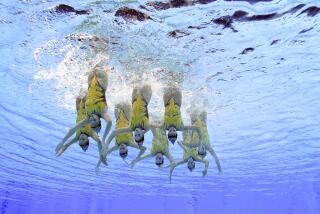A love song to rivers
- Share via
WHAT is it about rivers that brings out the inner Thoreau in writers? Maybe it’s because streams of water can be many things at once: menacing and peaceful, eternal and evanescent. A handy metaphor, in other words. Writing about rivers is also a convenient way to sound the alarm on global warming and its deleterious effects. Who among us wants to see the world’s rivers come to dust?
Certainly not Akiko Busch. The veteran design writer and author of “Geography of Home” has lived in the Hudson River Valley for years with her family, and as she moved toward 50, she realized that her life was becoming a series of estrangements. Close friends were dead, her youth was gone, and even her teenage boys communicated in a pop cultural codex completely foreign to her. So in August 2001 Busch capitulated to the lure of the Hudson River and dived in. “Swimming across the river,” she writes, “was about nothing more and nothing less than the possibility of getting there, somewhere, from here.”
Swimming provided a “sense of interior order” for Busch. She was determined to swim a different river (or two) every summer, and her resolve to do so only hardened after 9/11. It was a way for Busch to commune with the natural world, to feel her mind and body click into alignment at a time when the world had tumbled off its axis. Thus, we now have this gentle and elegiac book, “Nine Ways to Cross a River,” Busch’s chronicle of her adventures swimming across eight of our country’s rivers (she swims the Hudson twice).
Rivers are a natural wonder, but, Busch points out, they are also dumping grounds for all manner of trash -- both of the insidiously destructive and outright toxic kind -- and Busch interviews river advocates who are committed to holding back the tide of despoiling brought on by industrial neglect and carelessness. This is what makes her journeys so poignant; they remind the reader that the sense of restoration one locates in swimming rivers can also mirror the restoration of the river itself. As eco-jeremiads go, this book is refreshingly optimistic.
Busch is big fan of what she calls symbolic sports -- such as swimming. “I find an appeal in metaphorical exercise,” Busch writes, and she’s not kidding. These rivers take on a heavy symbolic burden. The Hudson’s submerged industrial detritus is a reminder for Busch of “the fact that we live with the unknown in everything we do.” While reflecting upon her Delaware River sojourn, Busch realizes that we are drawn to nature because “even in our most unconscious moments, all of its details ... illuminate us to ourselves.”
As insights into the human condition, these observations are rather banal. In straining to achieve that flash of absolute clarity in every river she crosses, Busch pushes too hard by conflating disparate ideas. A search for the proper entry point into the Susquehanna River by foot becomes an excuse to deride the information age and its substitution of knowledge for “Google literacy.” It seems to me that one doesn’t cancel out the other; they’re both valid ways of seeking information.
“Nine Ways to Cross a River” is more successful when Busch doesn’t try so hard for the eureka moment, but instead achieves a quiet eloquence. “Swimming is one of the few human endeavors in which activity and idleness can coincide, and it is entirely possible, often even desirable, to be a lazy swimmer. I am certain that there is something about exercising regular strokes that reaffirms the human appreciation of rhythm.” Maybe what a river does best is “go on and on. And it invites you to extend yourself in the same way.” When she downshifts the profundity, we can see a gift for nature writing that brings to mind Annie Dillard and Edward Abbey.
Marc Weingarten is the author of “The Gang That Wouldn’t Write Straight: Wolfe, Thompson, Didion, Capote & the New Journalism Revolution.”
More to Read
Sign up for our Book Club newsletter
Get the latest news, events and more from the Los Angeles Times Book Club, and help us get L.A. reading and talking.
You may occasionally receive promotional content from the Los Angeles Times.










